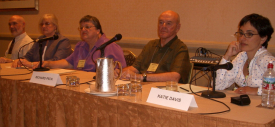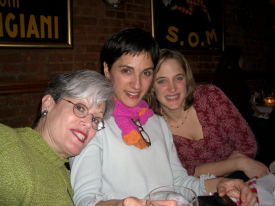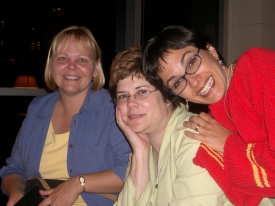I’ve always loved speaking at conferences. Why?
- I love helping people avoid the puddles I’ve stepped in. In other words, I love the teaching aspect, and sharing information.
- Again, I get to be surrounded by people who love books, literacy, and kids as much as I do.
- If I don’t get to be with friends – other authors who are also there to work – then I make new friends!
- I can broaden my reach (ie, people sign up for my newsletter and/or subscribe to my podcast after hearing me speak, and I often get school visit inquiries after a presentation).
- I’m a ham.
- I love making people laugh, and my presentations are an opportunity to do that (see ham comment, above).
There is a ton of work involved in creating a presentation, and the financial benefits aren’t big ones. But depending on what kind of conference I’m attending, I get to meet with book lovers, writers, teachers, and librarians so the payoff is enormous, both personally as well as professionally.

In the last few years, however, budgets have been cut and publishers haven’t been footing the bill as much as they used to, so my appearances at the alphabet conferences (as I call ALA and BEA, the American Library Association and Book Expo American, respectively) have fallen off. And I always seemed to miss the deadline for proposals for the SCBWI and local IRA conferences. Okay, fine. I admit it…. I’m not much of a proposal writer so I let it slide.
Then, in the summer of 2010 I decided I wanted to be invited to more conferences. I’d be pro-active!
Esther Hershenhorn, me, Kimberly Marcus at an SCBWI conference

I wrote my first proposal to the NY State Reading Association for their spring conference, 2011. When it was accepted I jumped up and down and screamed – right in the middle of the pumpkin patch where I waited for my family to hurry up and pick their pumpkins for Halloween (yes, I admit, I was looking at my iphone while I waited and saw the email from the NYSRA).
As I write this I am at that very conference. I’ve had an incredible time, have met wonderful reading teachers, met a young woman who impressed me so much I asked if I could record her right then and there for my podcast (I did, and her name is Sarah Parker, a masters student who taught formerly enslaved children in Africa) and at breakfast this morning, met a board member of the International Reading Association who was incredibly supportive and positive, especially when she started insisting I propose a presentation for the 2012 conference (that would be the national conference, a very big deal indeed).
Since then I’ve written a proposal to present at both the New England SCBWI and national summer conference, and both were accepted. This is not bragging—I’m not special, I just wrote the dang proposal! Now you just get around to writing your proposal. Great things can happen if you do!
I typically put in a minimum of 30-50 hours on a presentation.Why does it take so long? Aside from writing it, I also…
- want professional looking images. Skip the pixelated ones, and don’t use copyright-protected images from the internet. You can buy beautiful photos and illustrations from istockphoto.com for very little money, and they’ll give your presentation real polish.
- search for images within a theme. For example, for my NESCBWI presentation, I bought a series of very funny dorky people (some of which I’ve used in this series, since I now have a license to use them) so that my presentation will have a consistent look.
- find a palette I like. I went onto Martha Stewart’s website and used the colors she uses there, knowing she has a good eye when it comes to colors! My presentation looks consistent because of an appealing palette.
Big tip:
Whatever you do, do NOT put your entire speech on your slides. It’s the opposite of what you’re supposed to do when you write a book: tell, don’t show! Use your slides to support what you’re saying; don’t list your points on the screen and then just basically read what the audience can read for themselves. Otherwise, why do you even need to be there?!
Bigger tip:
Have fun!




2 Comments
Brenda Ferber
Katie, I love this idea, but I have a question… When your proposal gets accepted, do you ever have to pay to speak? That was my experience at an Illinois conference once, and it kept me from doing more of these. I showed up with my co-presenter, and they were like, “Um, we never received your conference fee. It’s $250 to attend.” It’s one thing to not get paid at all. But to actually pay them to let me speak? What the??
katie
Ah yes. This was a shocker for me, too. I don’t know about other conferences but it is true for IRA. If you are invited, they pay you. If you make a proposal, you pay to attend the conference. I had to seriously consider whether it was worth it to me, as there are other expenses, too, such as hotel, meals, travel, etc., all things that are usually paid by my hosts.
I spoke to author Dandi Daley Mackall and she advised me that once you get some experience doing that, it eases the way into possible invitations, but how will they know of you if you don’t start out that way?
At this conference this past weekend was a great succes because I met so many great people, and teachers, and made connections, so yes, I do think it was worth it. Hopefully at some point I’ll be invited to speak at IRA (national), and then we’ll see if this succeeded even further than my first impression of it!